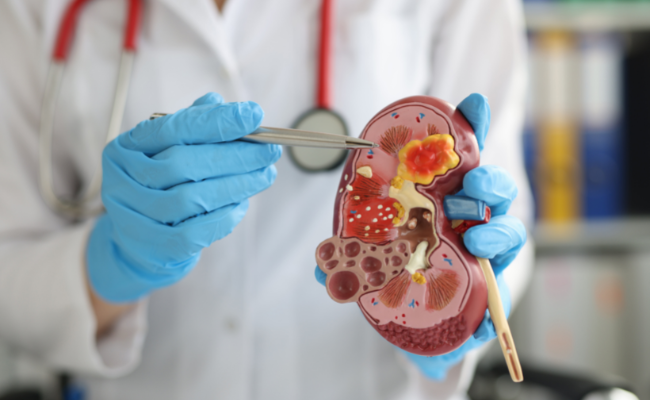Unique program offers hope for those with alcohol-related liver disease
Dealing with an addiction to alcohol can be overwhelming and feel like there is no hope for change. A new program recently launched for liver disease treatment uses a different approach. It provides individuals battling alcohol-related liver disease (ALD) the chance to take control of their lives.
In recent development, alcoholic liver disease is increasingly claiming the lives of younger people. Once primarily associated with older adults, cirrhosis or severe liver disease is now striking individuals as young as their twenties and thirties in the U.S.
While alcoholic liver disease was already a significant issue, a 2018 study has revealed that the problem is worsening. Deaths from alcoholic cirrhosis have been consistently rising since 2009. It has the sharpest increase reported among those aged 25 to 34.
TONIGHT: Drs. Jessica Mellinger and Scott Winder with @MichiganLiver will appear on the @NBCNightlyNews to discuss innovative care for alcohol use disorder. Make sure to tune into @nbc at 6:30 p.m. (ET) for the full segment. More on their work: https://t.co/DzcWgZLtyW
— Michigan Medicine (@umichmedicine) January 8, 2023
Unfortunately, current alcoholic liver disease treatment drugs may accompany severe side effects. This indicates that more evidence-based strategies are needed to reduce alcoholic cirrhosis prevalence before death rates become unsustainable.
The pandemic has profound effects on alcoholic liver disease, as 2017-2020 saw a rise in deaths associated with the illness. It even had a sharper incline during the first year of COVID-19. The Clinical Gastroenterology and Hepatology revealed this troubling trend in their March 2022 report. In addition, there was a notable increase among those who are 25-34 years old, particularly women.
According to a data from the Centers for Disease Control and Prevention’s National Center for Health Statistics., death rates for both men and women have risen year-over-year. While men had a higher mortality rate than women, the annual rate for women grew faster at 37%, compared to 29% for their male counterparts.
Liver Disease Causes
There's a growing number of young people with liver damaged from alcohol, and doctors say it's only gotten worse with the pandemic. @simplyzinhle looks at a program treating patients' physical and mental health to understand a patients' drive to drink.https://t.co/62OdDVDmJs
— NBC Nightly News with Lester Holt (@NBCNightlyNews) January 9, 2023
The rise of alcoholic liver disease is a complex social issue with multiple potential contributing factors. Some of them are the economic upheaval of the pandemic to existing underlying trauma to an increase in alcoholic beverage potency. According to Dr. Elliot Tapper, a liver disease expert and gastroenterology specialist at the University of Michigan Medical School in Ann Arbor, people have been “drinking more per unit volume” due to stronger alcoholic content.
In a groundbreaking development, Dr. Jessica Mellinger, a liver specialist at the University of Michigan Medical School, and her team have developed a unique alcoholic liver disease treatment program. It seeks to tackle underlying addiction issues to achieve success.
In addition, the includes medical care for alcoholic liver damage alongside mental health therapies and drug counseling. Treating only alcoholic liver damage but neglecting addiction is ineffective. In addition, it will lead to the patient’s eventual mortality from alcohol-related ailments.
Mellinger said, “We’re definitely seeing younger and younger patients coming in with what we previously thought was advanced liver disease seen in patients only in their middle age, 50s, and 60s.”
Liver Disease Treatment
Since 2018, Dr. Mellinger and her team at the University of Michigan’s Alcohol Improvement Program have been utilizing a revolutionary liver disease treatment. Their approach combines the expertise of both psychiatry and addiction specialists. Early research results are highly encouraging.
The positive results indicate that this approach might successfully prevent relapse in liver disease patients trying to recover from alcohol addiction. The multidisciplinary team is continually researching ways to help people with liver disease. They aim for patients to manage their conditions most effectively and reduce their risk for relapse.
A program psychiatrist and associate professor at the University of Michigan Medical School, Dr. Scott Winder, said, “We showed that health care utilization, how much [patients] got admitted to the hospital, how much they use the emergency room, all decreased.” The duration is between six months before the patients start the program and six months after.
According to addiction experts not involved in the Michigan program, having a psychiatrist see the patient, an addiction specialist, and a liver specialist can provide comprehensive care. Doing so can address any underlying issues related to liver disease treatment in addition to treating the addiction itself. Such an approach can support individuals to remain on track with their treatment plan and motivate them for lasting change.
Alcohol Addiction
Dr. Henry Kranzler, Benjamin Rush Professor of Psychiatry and director of the Center for Studies of Addiction at the University of Pennsylvania’s Perelman School of Medicine, believes that simply informing patients that they have liver disease and require the immediate cessation of drinking is not sufficient. Proper liver disease treatment is essential to achieve successful outcomes.
Kranzler said, “There needs to be a real thoughtful and concerted plan.” He continued, “It is more motivating because it’s more tangible than saying in a vague way if you will stop things will get better.” He also noted that the message to quit is more effective when the person sees scans of their liver.
A gastroenterologist, Dr. Shreya Sengupta, trained at the University of Michigan. She saw the value of the Michigan team’s strategy for liver disease treatment. Dr. Sengupta also started a similar program at the Cleveland Clinic. She specializes in liver transplantation and hepatology.


